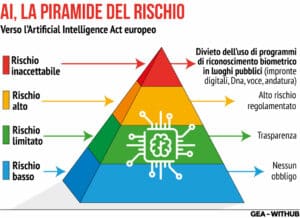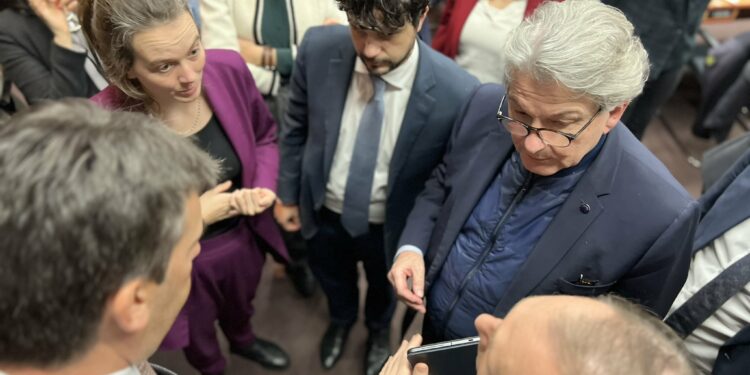Brussels – Twenty-two hours of negotiations, and agreement is still not in sight.The trilogue on the EU Artificial Intelligence Act is proving to be a far more complex hurdle to overcome, even compared to the eve forecast. Which were, yes, not particularly encouraging, but still with expectations of a breakthrough after hours of negotiating mutual compromises and concessions by negotiators from the EU Parliament and Council.

Instead, despite several steps forward, positions were not totally reconciled even after the decision was made to conduct an all-day meeting-meeting. Begun around 3:30 p.m. yesterday (Dec. 6), the inter-institutional negotiations continued unabated until after 1:30 p.m. today, when Internal Market Commissioner, Thierry Breton, announced on X that the trilogue was suspended and that “it will resume at 9 a.m. tomorrow morning” (Dec. 8). Reportedly, an agreement in principle has been reached on foundation models (a type of generative artificial intelligence trained on a broad spectrum of generalized, unlabeled data) starting with transparency obligations, while the real issue currently unresolved is that of prohibited practices for police forces:the pressure on Parliament negotiators is to accept the Council’s position almost in toto, with exceptions to biometric profiling on racial, political and religious grounds in the case of a link to a specific threat.

Just minutes away from the start of the record-breaking negotiations, linked by video from the Council at the ‘How Can We Govern Europe?’ event organized yesterday by Eunews, the Democratic Party’s head of delegation and co-rapporteur for the European Parliament on the EU Artificial Intelligence Act, Brando Benifei, he explained that “it is not certain that today’s trilogue will really be the decisive one, but we are positive and there is moderate optimism.” While the Regulation in its core issues “has already been agreed upon,” Benifei highlighted the “significant disagreements with the Council on some issues,” such as the “safety verification requirements for the most powerful models.” Yet after 22 hours of negotiations it was more the second point mentioned that was the real problem at the moment insurmountable: the “security safeguards on control and surveillance uses.” The Italian MEP had indicated the need to “find common ground with Council,” specifying that “we have to balance the need to put some openings to the requests for exceptions that the Council puts to us, with independent supervision so that the state does not control itself on compliance with the rules.”
What the EU Act on Artificial Intelligence provides for
It is April 21, 2021 the proposal for a regulatory framework on artificial intelligence presented by the European Commission for the development and use of cutting-edge technologies on EU soil. It is the first legislative initiative in the world to establish a regulatory approach on Ia systems. Both the Council and the European Parliament have decided to follow up on the approach presented by the executive, and what will emerge will be a scale of risk to regulate artificial intelligence applications at four levels: Minimal (AI-enabled video games and spam filters), limited (chatbots), high (scoring school and vocational exams, sorting resumes, assessing the reliability of evidence in court, robot-assisted surgery), and unacceptable (anything that poses a “clear threat” to people’s security, livelihoods, and rights, such as government ‘social scoring’).
 For the first level, no action is planned, while the last level will be banned entirely. Artificial intelligence systems that pose an unacceptable level of risk to people’s safety will be strictly banned, including systems that use intentional subliminal or manipulative techniques, exploit people’s vulnerabilities, or are used for social scoring. The amendment game is being played on the inclusion in this list also of remote biometric identification systems in publicly accessible spacesboth real-time and retrospectively- prompted by MEPs
For the first level, no action is planned, while the last level will be banned entirely. Artificial intelligence systems that pose an unacceptable level of risk to people’s safety will be strictly banned, including systems that use intentional subliminal or manipulative techniques, exploit people’s vulnerabilities, or are used for social scoring. The amendment game is being played on the inclusion in this list also of remote biometric identification systems in publicly accessible spacesboth real-time and retrospectively- prompted by MEPs
– biometric categorization systems that use sensitive characteristics (gender, ethnicity, citizenship, religion, political orientation) and from social media or CCTV cameras to create facial recognition databases. But also predictive policing systems (based on profiles, location, or past criminal behavior) and emotion recognition software also in border management, workplaces, and educational institutions.
Finally, as reminded to the international summit in the UK by the chairwoman of the EU Commission, Ursula von der Leyen, within the proposed EU EI Regulation there is also the possibility of creating a European Office for Artificial Intelligence. “This Office could deal with the most advanced Ia models, with responsibility for oversight,” the number one EU executive explained, pointing out that it would have to follow the four principles outlined in her speech on the global governance framework and enforce common rules across all 27 member states for the most advanced models. It emerged from von der Leyen’s words that the EU Office for Artificial Intelligence “should also have a global vocation,” collaborating with similar bodies around the world.
English version by the Translation Service of Withub






